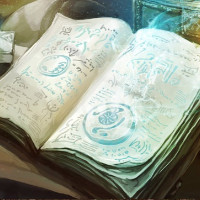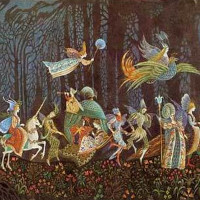Arcana
| ☰ Starting Guide | |
|---|---|
|
|
|
Arcana
Arcana is born of the Metaphorical Forces; more precisely, foreign Arcane Forces are antithetical to the individual dreams of the Godheads bleeding into one another, creating miracles that defy the natural laws each uses to ground reality. Every form of matter or Arcana can be traced back to the laws of another Plane by a Theorist. Upper-case Metaphor always refers to one of these forces.
Click here for the Arcana List ☰
Overview
|
Magic—or Arcana as it is formally referred to—is a constant factor of every day life for the denizens of Antarok. This inborn power is seen as a holy right to some, and sacrilege to others. Much of the strife in Antarok can be attributed to this supernatural power and the practitioners who use it. Whether it is the humble Artificer manufacturing golems to aid his Duties, or the ascetic mage who cultivates his power to devastating affect, these unnatural abilities are wielded to decide the outcomes of conflict while advancing societies across the world.
|
History
|
Known since before written record, before humanity devolved from the Æld'Norai, and before the Ælves devolved from the Faefolk, Arcana is a fundamental part of existence made possible by the planar Metaphor existing in all things. |
Personal Arcana
|
Personal Arcana refers to various disciplines split between the inborn powers of Galdr, Glamour, and Welkin, earned by birthright, circumstance, implantation, or ritual initiation. InitiationEach form of Personal Arcana has its own Initiation ritual to contend. Failing this ritual is often random and fatal, but as we are writing the story, we get to dictate if those in our purview should live or die. Initiating into a Personal Arcana requires expending a Minor Merit, but you may delay this so long as you cast none of its spells nor allocate XP to the discipline.
Spell ReservesA mage can cast one spell at their highest tier before experiencing Mageburn should they cast again. They may cast an additional spell at their highest tier for every discipline known of that same tier and source Metaphor. Additional spells beyond this limit will push them towards Light, Moderate, Heavy, and Fatal Mageburn. Spell Reserves for Galdr are derived from Aether, not the Metaphor they dominate. Glamour use Saol, and Poetics use Miasmata. Each of the Pacts follow their own Metaphor.
An Adult Dragon (*1.5 Saol) with Master Grist (1) and Master Nimhea (1) would have 1.5 * (1 + 1) Spell Reserves, thus able to cast 3 times at their highest tier with Saol Metaphor disciplines before entering Mageburn. They cast a Grist breath at Expert, and annotate that they did so in their post; they have 2.66 Master Spell Reserves left, as Expert is 1/3 of Master. MageburnEach discipline utilizes a different form of Mageburn. This confers a consequence casting if one's Spell Reserves would go into the negative, possibly leading to death. The closer a mage is to emptying their Spell Reserves, the more they will feel something associated with the Metaphor they wield; for example, Aether will make the mage feel powerful and manic the more they use their magic.
Spell RecoveryIt takes about seven days for a mage to recover from empty Spell Reserves to their full capacity. There are many ways in which a mage might eke out more efficiency in their spells or recovery, some of which are Draoidh, the expanded Spell Reserves of a Dragon, Ensorcelling, and Alchemistry.
Note: If you overuse your spells without playing out Mageburn, a member of staff might ask that you keep a ledger. TechniquesSeveral techniques exist in a general sense for altering how a mage might utilize their spells. Each relies on the fulfillment of a certain requirement or condition to be available to the mage. Multi-CastingMultiple spells can be cast in the same moment provided the mage is canting from a Mirrored Conjuration. Mastery in Meditation or casting with a Spirit Familiar might also confer this capability. Metaphorical ExpressionMagi can wield Metaphor to empower their spells through emotive action and circumstance. See: Metaphor |
Articles on Arcana
|
Definitions |
Arcana · Arcana List · Potential · Variant · Gramarye · Theorem · Planes · Metaphor · Ascension |
|
Practices |
Practices · Alkahest · Contrivances |
|
Galdr |
Galdr |
|
Glamour |
Glamour |
|
Welkin |
Welkin · Pact · Poetics · Blight |
|
Planes |
Aetherium · Antarok · Ælphyne · Avernus· Gehenna· Arcadia Aarda· Ur'Duun · Céleste · Lacon · Æylune · Læloch · Nihilos |
|
Metaphor |


